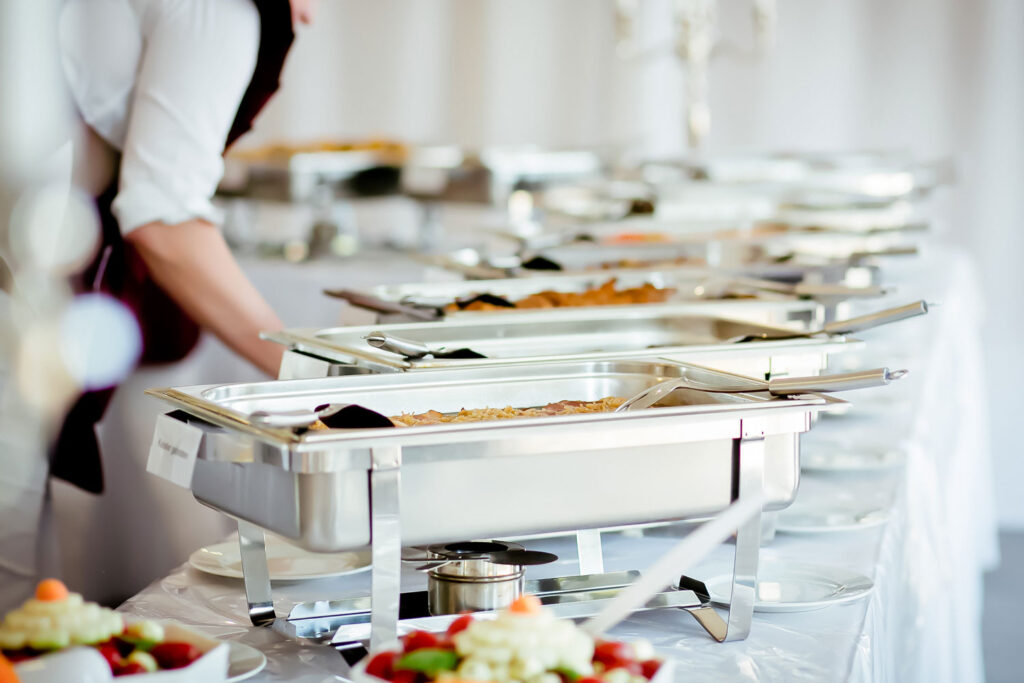Have you ever dreamt of running your own catering business? Are you passionate about food and eager to share your culinary skills with others? Starting a catering business can be an exciting and rewarding venture, allowing you to showcase your creativity and provide delightful dining experiences for various events. In this article, we will guide you through how to start a catering business.
A catering business involves providing food and beverage services for events such as weddings, corporate functions, parties, and other special occasions. Caterers are responsible for creating and serving delicious meals, handling logistics, and ensuring exceptional customer service. The content is presented by https://blog-collector.org/
Why start a catering business?

Starting a catering business can offer numerous advantages. It allows you to turn your passion for cooking into a profitable venture, work in a dynamic and creative environment, and have the flexibility to choose your own clients and events. Additionally, the demand for catering services is constantly growing, presenting ample opportunities for success.
Market Research and Target Audience
Before diving into the catering industry, conducting thorough market research is crucial. Understand the local market, competitors, and target audience. Identify the types of events and clients you want to cater to. This will help you tailor your services to meet their specific needs and preferences.
Creating a Business Plan
A well-crafted business plan is the foundation of any successful venture. Define your catering services, whether you’ll specialize in weddings, corporate events, or themed parties. Determine your niche and unique selling points that differentiate you from competitors. Set clear goals and objectives, and develop a comprehensive marketing strategy to promote your business. Discover the steps to approach local businesses for sponsorship
Legal and Regulatory Requirements
Starting a catering business involves complying with legal and regulatory requirements. Register your business and obtain the necessary permits and licenses. Ensure that you adhere to health and safety regulations to maintain the highest standards of food hygiene and quality.
Setting Up Your Kitchen and Equipment
Choosing a suitable location for your kitchen is vital. Consider factors like proximity to your target market, transportation access, and space requirements. Purchase or lease high-quality catering equipment that meets your specific needs. Organize your kitchen efficiently to streamline operations and maximize productivity.
Building a Menu
Crafting an enticing and diverse menu is essential for attracting clients. Consider your target audience’s preferences and dietary restrictions. Source high-quality ingredients and experiment with creative recipes to offer a memorable culinary experience.
Managing Finances and Pricing
Estimate your startup costs, including equipment, licenses, marketing expenses, and initial inventory. Set competitive pricing that factors in your costs, profit margin, and market demand. Implement a system to track your expenses and revenues to ensure financial stability and growth.
Hiring and Training Staff
Identify the staffing needs of your catering business. Recruit skilled and dedicated employees who share your passion for providing exceptional service. Conduct thorough interviews and provide comprehensive training to equip your staff with the necessary skills and knowledge.
Marketing and Promoting Your Catering Business
Establishing a strong online presence is crucial in today’s digital age. Create a professional website that showcases your services, menu, and testimonials. Utilize social media platforms to engage with potential clients and share captivating visuals of your culinary creations. Attend networking events and collaborate with event planners to expand your reach.
Managing Operations and Logistics
Efficiently managing operations and logistics is key to success in the catering business. Develop a system for handling event bookings, contracts, and client communication. Plan and execute events meticulously, ensuring seamless logistics and timely delivery of food and beverages.
Providing Exceptional Customer Service
Delivering exceptional customer service is vital for building a stellar reputation and securing repeat business. Understand your client’s expectations, communicate effectively, and accommodate their specific requests. Going the extra mile to exceed their expectations will leave a lasting impression.
Scaling and Growing Your Catering Business
Regularly analyze your business performance and seek feedback from clients. Identify opportunities for growth and expansion, such as offering additional services like event planning or themed decorations. Continuously innovate and stay ahead of market trends to keep your business thriving.
Conclusion
Starting a catering business can be a fulfilling and profitable venture for food enthusiasts and entrepreneurs alike. By following the steps outlined in this article, you can lay a solid foundation for your business and set yourself up for success. Embrace the challenges, showcase your culinary talents, and create unforgettable experiences for your clients.
FAQs
Q1: How much money do I need to start a catering business?
The amount of money needed to start a catering business can vary depending on various factors, including the scale of your operations, kitchen setup costs, equipment expenses, licenses, and marketing efforts. Conduct a thorough analysis of your specific requirements and create a detailed budget plan.
Q2: Do I need professional culinary training to start a catering business?
While professional culinary training can be beneficial, it is not a strict requirement. Many successful caterers have honed their skills through hands-on experience and a genuine passion for food. However, investing in culinary courses or gaining experience in the industry can provide valuable knowledge and expertise.
Q3: How can I attract clients to my catering business?
To attract clients, develop a strong marketing strategy. Create an appealing website, maintain an active presence on social media platforms, collaborate with event planners, and leverage word-of-mouth referrals. Offer unique menu options, showcase your previous work, and provide excellent customer service to leave a positive impression on potential clients.
Q4: How do I handle dietary restrictions and special requests from clients?
It’s crucial to be accommodating when it comes to dietary restrictions and special requests. Maintain clear communication with clients before the event to understand their specific needs. Design a menu that includes options for various dietary preferences and allergies. Train your staff to handle special requests and ensure that all necessary precautions are taken.
Q5: How can I stay ahead in the catering industry?
To stay ahead in the catering industry, continuously innovate and stay updated with current food trends. Attend culinary workshops and industry events to expand your knowledge and network. Seek feedback from clients and incorporate it into your services. Stay adaptable and flexible to cater to changing client demands.
You may like to read Top five tips for female entrepreneurs

